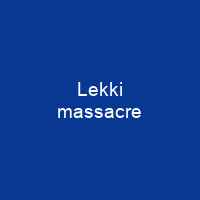On 20 October, members of the Nigerian Army opened fire on peaceful End SARS protesters at the Lekki toll gate in Lagos State, Nigeria. Amnesty International stated that at least 12 protesters were killed during the shooting. Nigerian disc jockey DJ Switch, made a livestream video of the shooting on her Instagram account. She said that armed soldiers and police officers shot at her and other peaceful #EndSARS protesters.
About Lekki massacre in brief

The CCTV footage and other footages showed soldiers shooting at and killing protesters. The admissions nonetheless, the Nigeria Army continues to deny that itsOfficers shot at and killed protesters. The documentary also revealed that several of the bullets originated from Serbia from where Nigeria had imported bullets every year between 2005 and 2016. The independent investigation showed geolocated photographs of victims and eyewitness accounts as well as the families of victims alongside verified trended videos of the Shooting using using timestamps and data from the video files. CNN said that Nigerian authorities refused them a response when contacted for clarifications. Nigeria’s Minister of Information, Lai Mohammed, accused CNN of ‘irresponsible journalism’ and described the documentary of the product of fake news and disinformation. A month after the incident, CNN aired a six-minute documentary on the shooting in which it was able to establish that several bullets were from Serbia. The footage stopped at about 8 pm because the CCTV had been tampered with ostensibly to provide cover for the shooting by the Concession Company. The video was shown by the Corroborating Company to the panel because the footage had been stopped about 8pm because the surveillance cameras were tampered. A week later, however, the Nigerian Army admitted that it had deployed soldiers to the toll Gate on the orders of the governor of Lagos state.
You want to know more about Lekki massacre?
This page is based on the article Lekki massacre published in Wikipedia (as of Nov. 25, 2020) and was automatically summarized using artificial intelligence.







